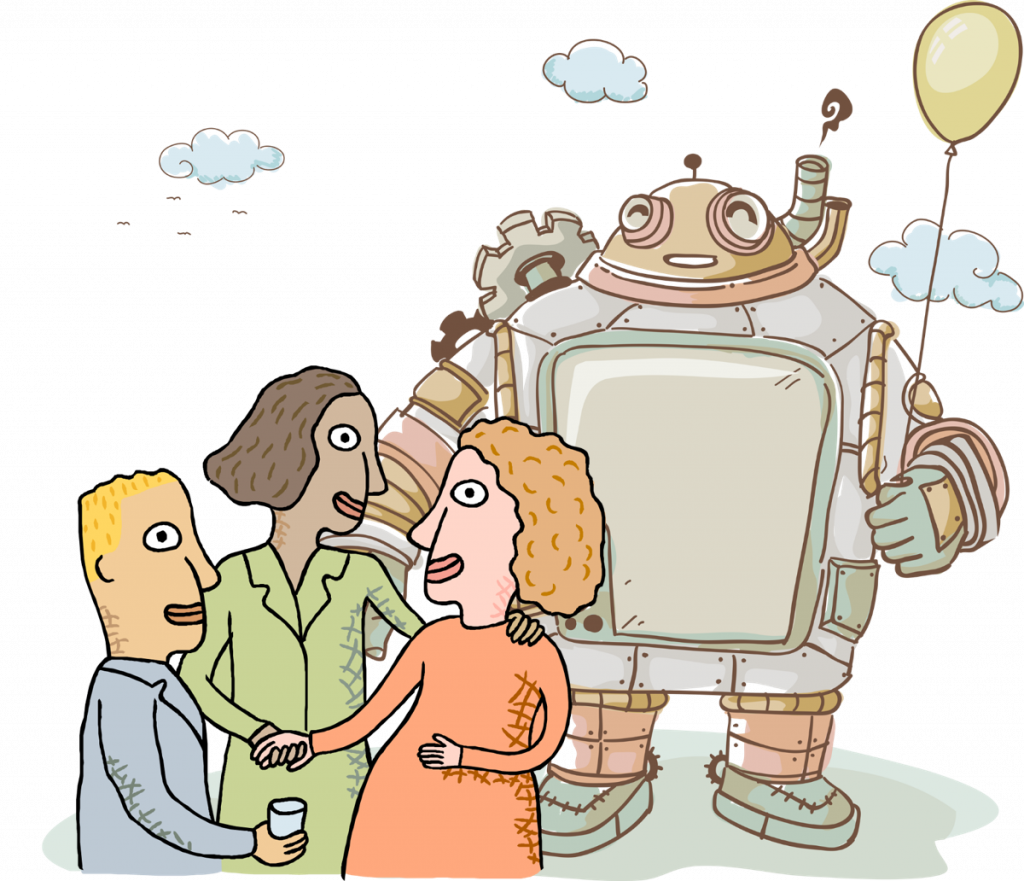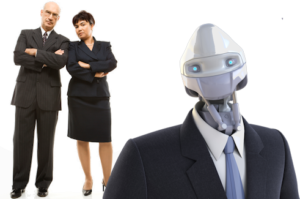Most of us have heard the ballad about the legendary John Henry — a powerful African American who worked on the railroad driving holes into rock so dynamite could be inserted allowing railways to blast through mountains. The ballad recalls a race between John Henry and a steam-powered rock drilling machine, a race Henry won only to die of a heart attack with the hammer still in his hand. According to Mitch Mac Donald, Group Editorial Director at DC Velocity, “[John Henry’s story is] a classic American man-versus-machine tale that resonated with the era’s working people, who feared that the coming of machines would cost them their jobs.”[1] He continues, “Fast-forward to the modern day, and we still hear echoes of the old John Henry story — only now, the new-fangled machines aren’t steam drills, but robotics and automated equipment. The fears are the same: Companies will bring in machines to replace humans, sending people to the unemployment line.” It’s a legitimate concern. Mac Donald, however, believes society will adjust to new workplace realities the same way it adjusted to past technology-related changes in the workplace. He explains, “Robotics and automation may indeed replace some of the more repetitive jobs now done by people. But that doesn’t mean those people will be out on the street. Most of them will learn new skills, find new jobs, and be relieved of the mundane, sometimes backbreaking, tasks that give manual labor a bad name.”
Hybrid jobs and super jobs
In pursuit of new jobs requiring new skills, Sheryl Estrada reports many workers will be asked to fill hybrid jobs. She explains, “Hybrid jobs, those that require a blend of technical and soft skills, are evolving into ‘super jobs’. As employers adopt tools, including robotic process automation and AI, that can do some of the work that talent would previously have been hired to do, technology changes the nature of the work. Across industries, these evolving jobs require a combination of skills or hybrid skill sets, which include analytical abilities, empathy, communication and a desire to learn.”[2] As she notes, some of these jobs are being classified as super jobs. Deloitte Principals, Erica Volini (@erica_volini), Jeff Schwartz (@JL_Schwartz), and Brad Denny, explain, “As robotics and AI enter the workforce, organizations are finding that virtually every job can — and probably should — be redesigned. This is creating completely new categories of work, most notably hybrid jobs and superjobs.”[3] Author and speaker Kate O’Neill (@kateo) believes new workplace tensions are arising because, “Business tends to focus on the future of work and humans tend to focus on the future of jobs.”[4] According to O’Neill, “The real potential for the future is in aligning them. … There’s a lot to unpack in the increasingly anxious questions humans ask about the future, but the key thing first is the difference between how we consider the future of work and the future of jobs.”
O’Neill states a simple truth: “In pursuit of greater profits and greater revenues, companies will continually invest in more efficient methods of achieving results.” Inevitably, greater efficiency means more automation. As a result, O’Neill notes, “It no longer sounds alarmist to say that at least some parts of our jobs are probably going to be replaced by automation and/or by cognitive computing. Depending on which forecast you consult, as many as half of all job categories risk complete replacement by machines. There are certainly going to be impacts on the economy, on production, on efficiencies of scale, and on innovation.” Workers whose jobs are changed as a result of technology are going to require retraining and reskilling. The same is true of future business executives. O’Neill explains, “One thing is clear: there are going to need to be emerging skills in the workplace for managing combined teams of humans and machines.” McKinsey analysts Bryan Hancock, Kate Lazaroff-Puck, and Scott Rutherford insist it’s time to get practical about the future of work.[5] They assert, “Adapting to a digital age will require organizations — and not just employees — to equip themselves with new capabilities.”
Realities of the new job landscape
The McKinsey analysts write, “Our modeling shows that by 2030, up to 30 to 40 percent of all workers in developed countries may need to move into new occupations or at least upgrade their skill sets significantly. Research further suggests that skilled workers in short supply will become even scarcer.” The worse possible scenario is millions of workers made redundant by technology without any hope of finding new employment. Some studies have concluded the best outcomes are achieved when machines and humans collaborate in the workplace. This kind of collaboration will require training and new skills. McKinsey analysts note, “Employers are best placed to be in the vanguard of change and make positive societal impact — for example, by upgrading the capabilities of their employees and equipping them with new skills. And employers themselves stand to reap the greatest benefit if they can successfully transform the workforce in this way.” Bob Moritz (@Bob_Moritz), Global Chairman of PwC, predicts, “In the long run, everyone will need upskilling in some form.”[6] He adds, “With upskilling, it isn’t just the people themselves who benefit — but also businesses, the wider economy in which they operate and society as a whole. PwC’s latest Global CEO Survey … reveals a clear correlation between economic optimism, confidence about future revenues and progress in upskilling.”
Moritz is quick to point out that reskilling or upskilling isn’t all about hard skills. He explains, “Although people may have fears about the future, they want to evolve. For some, upskilling means learning how to code and leveraging and scaling technologies. For others, it’s about understanding what technology can do and how it can drive innovation. It’s also about much more than hard skills like learning new digital tools and competencies. The soft skills — leadership, adaptability, how to translate feedback into measurable change — are what make the short-term skills training more long-lasting and transformative.”
Concluding thoughts
All stakeholders (i.e., businesses, employees, academics, and politicians) need to work collaboratively to ensure alignment between work and jobs results in a prosperous and meaningful future. McKinsey analysts conclude, “Senior managers may miss opportunities to work collaboratively with employees to create a prosperous and fulfilling future for all stakeholders — the communities where the company operates, its workforce, and the wider society that ultimately sanctions its activities.” O’Neill adds, “What matters in all of this is that humans have the opportunity for meaningful experiences in the future, whether they derive from work or not. … Digital transformation is about transforming business models and practices to align with data-centered commerce and optimization. Part of that is workplace transformation — readying the organization, infrastructure, etc. to deal with remote, contract, robots, virtual, etc. And part is job transformation — recognizing the evolution of roles and job scopes, and preparing the people on your team to be ready for the work ahead.” Almost every job in the future will be touched by technology (i.e., will be a hybrid job). Hybrid jobs require workers to have hybrid skills if they are going to be successful.
Footnotes
[1] Mitch Mac Donald, “No, a robot will not take your job (but it might change it),” DC Velocity, 30 December 2019.
[2] Sheryl Estrada, “Hybrid jobs: Age of AI requires soft, tech skills mix,” CIO Dive, 29 January 2020.
[3] Erica Volini, Jeff Schwartz, and Brad Denny, “From Jobs to ‘Superjobs’,” The Wall Street Journal, 12 August 2019.
[4] Kate O’Neill, “The Future of Work vs. the Future of Jobs,” Medium, 9 January 2020.
[5] Bryan Hancock, Kate Lazaroff-Puck, and Scott Rutherford, “Getting practical about the future of work,” McKinsey & Company, January 2020.
[6] Bob Moritz, “How do we upskill a billion people by 2030? Leadership and collaboration will be key,” World Economic Forum, 22 January 2020.





